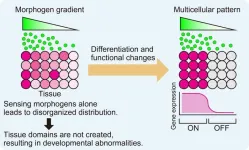(Press-News.org) The cells in your pancreas, like people, can only handle so much stress before they start to break down. Certain stressors, such as inflammation and high blood sugar, contribute to the development of type 2 diabetes by overwhelming these cells.
Researchers at The Jackson Laboratory (JAX) have now discovered that DNA sequence changes known to increase a person’s risk for diabetes are linked to how well pancreatic cells can handle two different kinds of molecular stress. In people with these DNA changes, the insulin-producing cells in the pancreas may be more likely to fail or die when exposed to stress and inflammation.
“Ultimately we want to develop new ways to prevent and treat type 2 diabetes by targeting the genes and pathways that are perturbed in people who are most susceptible to the disease,” said Michael L. Stitzel, associate professor at JAX and co-senior author of the new study with JAX professor Dugyu Ucar, published in the Oct. 8 advanced online issue of Cell Metabolism. “These findings give us new insight into some of those genes and pathways.”
The work points toward dozens of genes that connect cell stress and diabetes risk, including one that is already under investigation as a drug target for type 2 diabetes complications.
Cells under stress
When living cells face challenges, including damage, inflammation, or nutrient changes, they activate protective responses to try to cope with and reverse the stress. But over time, sustained stress can overwhelm the cells, causing them to slow down or die.
In the pancreas’ islet beta cells, two types of cell stress have previously been implicated in the development of type 2 diabetes.
Endoplasmic reticulum (ER) stress occurs when the cells become overwhelmed with a high demand to produce proteins—like insulin to help regulate blood sugar levels.
Cytokine stress occurs when the immune system sends excessive inflammatory signals—as can occur in obesity and metabolic disease.
In both cases, the stress can eventually lead islet beta cells to stop producing insulin or die off.
Stitzel and his colleagues wanted to know what genes and proteins were used by islet cells to respond to both ER stress and cytokine stress.
“Researchers have completed multiple studies looking at what molecular pathways are important in regulating insulin production in happy, healthy islet cells,” said Stitzel. “But we were working on this hypothesis that islet cells are not always happy. So what pathways are important when the cells are under stress, and how do diabetes-linked DNA sequence changes in each of us affect them?”
Stress-response genes
Stitzel’s group exposed healthy human islet cells to chemical compounds known to induce either ER stress or cytokine stress. Then, they tracked changes to levels of RNA molecules in the cells as well as how tightly or loosely packed different stretches of DNA were inside the cells—a proxy for what genes and regulatory elements are being used by the cells at any given time.
To analyze the results, the team collaborated with Ucar, a professor and computational biologist at JAX . Together, the scientists found that more than 5,000 genes, or nearly a third of all the genes expressed by healthy islet cells, change their expression in response to ER stress or cytokine stress. Many were involved in the production of proteins, which is crucial for islet cells insulin-producing role. And most of the genes were only involved in one or the other stress response, raising the idea that two separate stress pathways play a role in diabetes.
In addition, around one in eight regulatory regions of DNA typically used in islet cells were altered by stress. Importantly, 86 of these regulatory regions had been previously found to contain genetic variants in people most at risk of type 2 diabetes.
“What this suggests is that people with these genetic variants may have islet cells that respond worse to stress than other people,” said Stitzel. “Your environment – things like diabetes and obesity—pulls the trigger with type 2 diabetes, but your genetics loads the gun."
Stitzel hopes that the new list of regulatory regions and genes eventually lead to new drugs to prevent or treat diabetes by potentially making islet cells more resilient to stress.
A druggable target
The researchers homed in one gene that was altered by both ER stress. Called MAP3K5, the gene was shown to alter islet beta cell death in mice containing a diabetes-causing mutation in the insulin-encoding gene.
In the new paper, Stitzel and his colleagues showed that higher levels of MAP3K5 led to more islet beta cells dying in response to ER stress. Eliminating or blocking MAP3K5, on the other hand, made the islet cells more resilient to ER stress and less likely to die.
Early studies of Selonsertib, a drug targeting MAP3K5, have showed that it could reduce the risk of severe complications of diabetes. The new results point toward another possible role of the drug—in the prevention of diabetes in people most at risk of the disease, to help their islet cells remain functioning and alive in the face of cellular stress.
“It’s really exciting that this therapeutic is already in clinical trials but much more work is needed to understand whether the drug might be able to be leveraged in primary prevention,” said Stitzel.
END
How diabetes risk genes make cells less resilient to stress
Some genetic factors predisposing people to diabetes might change the way pancreatic cells respond to molecular stress, researchers at The Jackson Laboratory discovered.
2024-10-08
ELSE PRESS RELEASES FROM THIS DATE:
Aerobic physical activity and depression among patients with cancer
2024-10-08
About The Study: In this systematic review and meta-analysis, aerobic physical activity was associated with modest short-term and long-term reductions of depression among adults with cancer. Future studies should discern the effectiveness of aerobic physical activity in combination with other strategies for managing depression across various populations of patients with cancer.
Corresponding author: To contact the corresponding author, Sapna Oberoi, M.D., M.Sc., email soberoi@cancercare.mb.ca.
To access the embargoed study: ...
Incidence of hospitalizations involving alcohol withdrawal syndrome
2024-10-08
About The Study: In this cohort study of a large primary care population served by an integrated health system, alcohol withdrawal syndrome (AWS) hospitalizations were common, especially in male patients, younger age groups, and individuals with high-risk alcohol use. During hospitalizations, the burden of AWS was similar to or exceeded complications of other chronic diseases that receive greater medical attention.
Corresponding author: To contact the corresponding author, Tessa L. Steel, M.D., M.P.H., email tessita@uw.edu.
To access the embargoed study: Visit our For The Media website at this link https://media.jamanetwork.com/
(doi: ...
Study: One-time cooperation decisions unaffected by increased benefits to society
2024-10-08
A new study published in the Proceedings of the National Academy of Sciences (PNAS) challenges long-held assumptions about human cooperation. Traditionally, behavioral scientists and economists have primarily studied cooperation in public good contexts through repeated interactions, where individuals can build trust and reciprocal relationships, adjusting their behavior based on the actions of others. However, many real-world, naturally occurring situations, such as volunteering or donating ...
Soil volatile organic compound profiles as indicators for soil evaluation in soybean fields
2024-10-08
Tsukuba, Japan—Maintaining soil health is crucial for sustainable agriculture. Recently, soil volatile organic compounds (VOCs) have emerged as promising indicators for assessing soil health. This study aimed to evaluate the effectiveness of soil VOC profiles as indicators of soil health in soybean fields.
Soil samples were collected from soybean fields in Fukushima Prefecture, which exhibited diverse soil conditions, over the past three years. These samples were analyzed for VOC content in conjunction with data on soil physical properties, soil metabolome, soil ionome, and soil microbiome as well as rhizosphere chemicals ...
Shedding light on how tissues grow with sharply defined structures
2024-10-08
Researchers at Nano Life Science Institute (WPI-NanoLSI), Kanazawa University, demonstrate how morphogens combined with cell adhesion can generate tissue domains with a sharp boundary in an in vitro model system.
Recent advances that have enabled the growth of tissue cultures into organoids and embryoids have heightened interest as to how tissue growth is controlled during the natural processes of embryo development. It is known that the diffusion of signaling molecules called morphogens directs patterned tissue growth ...
JAMA Network launches JAMA+ AI
2024-10-08
October 8, 2024 (Chicago) — The JAMA Network today announces the launch of JAMA+ AI, an engaging, interactive channel that amplifies the best of the JAMA Network’s content exploring the science of artificial intelligence and digital medicine and its application in health and health care.
JAMA+ AI is a window into the premier scientific content, educational reviews, and commentary on AI and medicine published across JAMA, JAMA Network Open, and the 11 JAMA specialty journals. JAMA+ AI builds on that content with new multimedia materials, including interviews ...
Climate report warns of escalating crisis, urges immediate action as UN summit nears
2024-10-08
CORVALLIS, Ore. – An international coalition led by Oregon State University scientists concludes in its annual report published today that the Earth’s worsening vital signs indicate a “critical and unpredictable new phase of the climate crisis” and that “decisive action is needed, and fast.”
The collaboration directed by OSU’s William Ripple and former postdoctoral researcher Christopher Wolf outlines areas where policy change is needed – energy, pollutants, nature, food and economy – in “The 2024 State of the Climate Report: Perilous Times on Planet Earth,” published ...
Scientists issue urgent warning on climate emergency
2024-10-08
A new report published in BioScience warns that the world is facing a climate emergency of unprecedented magnitude. The "2024 State of the Climate Report," by an international team of scientists led by Oregon State University's William Ripple and Christopher Wolf, presents alarming evidence that climate change is worsening at a dangerous pace.
In the report, the authors update 35 annually reported "planetary vital signs," which provide ongoing timeseries of human climate-related activities ...
First successful demonstration of a dual-media NV diamond laser system
2024-10-08
Measuring tiny magnetic fields, such as those generated by brain waves, enables many new novel opportunities for medical diagnostics and treatment. The research team led by Dr. Jan Jeske at Fraunhofer IAF is working on a globally innovative approach to precise magnetic field measurements: Laser Threshold Magnetometry. The researchers have now combined an NV diamond and a laser diode in a resonator, successfully demonstrating the sensor system with two active media for the first time. This outstanding paper has been published in Science Advances and represents a significant progress in the BMBF-funded research project NeuroQ.
Quantum ...
A call to bridge the gap in cancer clinical trial funding
2024-10-08
CHAPEL HILL, North Carolina — A growing reliance on industry-sponsored cancer clinical trials in the United States is a reason for concern, say researchers from the UNC Lineberger Comprehensive Cancer Center.
In a Journal of Clinical Oncology editorial, Yara Abdou, MD, and Norman E. Sharpless, MD, responded to a new study by the Fred Hutchinson Cancer Center in Seattle that found enrollment in industry-sponsored cancer clinical trials doubled between 2008 and 2022 while federally supported trial enrollment remained flat. From 2018 to 2022, cancer clinical trial enrollment was eight times greater in industry-sponsored studies compared to federal studies.
Abdou and Sharpless called ...
LAST 30 PRESS RELEASES:
ASU researchers to lead AAAS panel on water insecurity in the United States
ASU professor Anne Stone to present at AAAS Conference in Phoenix on ancient origins of modern disease
Proposals for exploring viruses and skin as the next experimental quantum frontiers share US$30,000 science award
ASU researchers showcase scalable tech solutions for older adults living alone with cognitive decline at AAAS 2026
Scientists identify smooth regional trends in fruit fly survival strategies
Antipathy toward snakes? Your parents likely talked you into that at an early age
Sylvester Cancer Tip Sheet for Feb. 2026
Online exposure to medical misinformation concentrated among older adults
Telehealth improves access to genetic services for adult survivors of childhood cancers
Outdated mortality benchmarks risk missing early signs of famine and delay recognizing mass starvation
Newly discovered bacterium converts carbon dioxide into chemicals using electricity
Flipping and reversing mini-proteins could improve disease treatment
Scientists reveal major hidden source of atmospheric nitrogen pollution in fragile lake basin
Biochar emerges as a powerful tool for soil carbon neutrality and climate mitigation
Tiny cell messengers show big promise for safer protein and gene delivery
AMS releases statement regarding the decision to rescind EPA’s 2009 Endangerment Finding
Parents’ alcohol and drug use influences their children’s consumption, research shows
Modular assembly of chiral nitrogen-bridged rings achieved by palladium-catalyzed diastereoselective and enantioselective cascade cyclization reactions
Promoting civic engagement
AMS Science Preview: Hurricane slowdown, school snow days
Deforestation in the Amazon raises the surface temperature by 3 °C during the dry season
Model more accurately maps the impact of frost on corn crops
How did humans develop sharp vision? Lab-grown retinas show likely answer
Sour grapes? Taste, experience of sour foods depends on individual consumer
At AAAS, professor Krystal Tsosie argues the future of science must be Indigenous-led
From the lab to the living room: Decoding Parkinson’s patients movements in the real world
Research advances in porous materials, as highlighted in the 2025 Nobel Prize in Chemistry
Sally C. Morton, executive vice president of ASU Knowledge Enterprise, presents a bold and practical framework for moving research from discovery to real-world impact
Biochemical parameters in patients with diabetic nephropathy versus individuals with diabetes alone, non-diabetic nephropathy, and healthy controls
Muscular strength and mortality in women ages 63 to 99
[Press-News.org] How diabetes risk genes make cells less resilient to stressSome genetic factors predisposing people to diabetes might change the way pancreatic cells respond to molecular stress, researchers at The Jackson Laboratory discovered.



